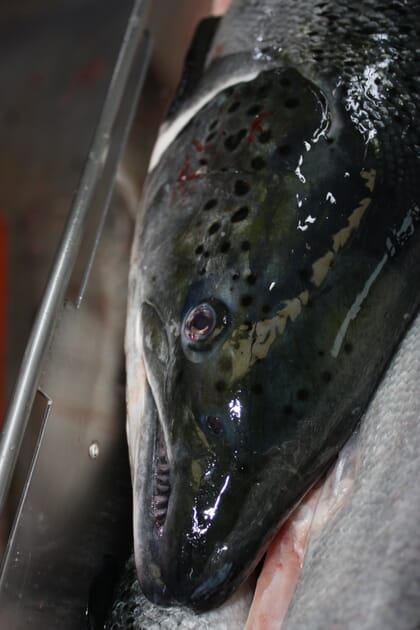
More recently some farmers have adopted electrical stunners, which are designed to be effective without the need to remove the fish from the water
According to The Humane League (THL), fish are not included in the Welfare of Animals at the Time of Killing regulations, meaning there are no specific requirements as to how they should be delivered, held, stunned or killed. This makes the 77 million farmed fish killed in the UK every year vulnerable to unnecessary suffering at slaughter, they argue.
Despite most fish producers using automated - usually percussive - stunning machines, these are not always effective. Indeed, an undercover investigation by Animal Equality into a slaughterhouse operated by The Scottish Salmon Company - the footage of which was released earlier this year - showed fish having their gills cut while conscious and some being repeatedly clubbed in an attempt to stun the animals – prompting outrage from the animal welfare sector.
This was followed up by freedom of information (FOI) requests by THL, who now claim that the Government and public bodies responsible for overseeing animal welfare are failing to inspect farmed fish welfare at slaughter.
The FOIs, carried out over summer and autumn, show that there is no established process for regular welfare inspections at fish processing sites, despite legislation requiring animals including fish to “be spared any avoidable pain, distress or suffering during their killing and related operations”.
Cordelia Britton, head of campaigns at THL UK, said: “It is alarming that apparently zero government officials are inspecting fish welfare at slaughter. From our correspondence it seems clear that no relevant agency knows what’s going on, with each institution passing the buck to another. Without proper oversight, cruelty goes unnoticed - it is time for the Government to take responsibility for how farmed fish are slaughtered, as they do for other farmed animals.”
Survey supports new legislation
The release of the FOIs comes as The Humane League UK launched its Forgotten Fish Campaign and a petition calling on the Government to update the law to mandate pre-slaughter stunning for farmed fish.
THL-commissioned research from YouGov also revealed substantial support for fish welfare reform, including 67 percent of people saying they believed fish feel pain.
Asked “To what extent do you agree or disagree that fish should have the same legal protections as other farmed animals?”, the average number of those who agreed was 71 percent.
The 2017 European Commission report on the welfare of farmed fish states that fish welfare inspections in Scotland are the responsibility of the Animal and Plant Health agency (APHA) and Marine Scotland.
Marine Scotland informed The Humane League that it does not conduct welfare checks, but that the APHA may “possibly” conduct them. However, the charity was informed by APHA that it “does not have a routine programme of official inspections at fish processing sites”. A follow-up FOI earlier this month established that welfare checks at slaughter are still not occurring.
The situation for trout farming in England and Wales is similar. The Humane League was told that neither the Food Standards Agency nor the Fish Health Inspectorate conduct welfare inspections of fish slaughterhouses in England and Wales, and that the Environmental Health departments of local authorities conduct these instead. However, Environmental Health responded to say that APHA was actually responsible for conducting fish welfare checks. APHA subsequently informed THL that it does not conduct regular inspections of fish processing sites.
As a result, The Humane League UK believes that no government officials in the UK are monitoring fish welfare at the time of killing.
Dr Vicky Bond, managing director of The Humane League UK, said: "Fish are often forgotten in discussions and decisions on animal welfare, and this is wholly unjustified. The scientific and public consensus is that they feel pain, so refusing farmed fish the same protections afforded to land animals is completely irrational. The government Animal Welfare Committee suggested the law be updated with detailed stunning requirements back in 1996, and 25 years later farmed fish still have the same inadequate safeguards. This needs to change.”




